Search Results
Showing results 481 to 500 of 956
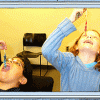
Grow Rock Candy
Source Institutions
Learners grow sugar crystals (rock candy). They make a hot solution that has an excess of sugar dissolved in it, then as the solution cools, they see sugar crystals form.
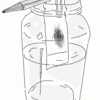
Show Your Colors!
Source Institutions
In this family or group activity, learners conduct a chromatography experiment to reveal the colors that leaves "hide" under their green pigments.

Colored Shadows
Source Institutions
In this optics activity, learners discover that not all shadows are black. Learners explore human color perception by using colored lights to make additive color mixtures.
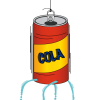
Pop Can "Hero Engine"
Source Institutions
In this activity, learners build water-propelled engines from soft drink cans.

Building Tall
Source Institutions
In this engineering activity (page 2 of PDF), young learners investigate how a wide base can make a building more stable. Learners use blocks or boxes of different sizes to construct stable towers.

Exploring Fabrication: Self-Assembly
Source Institutions
In this activity, learners participate in several full-body interactive games to model the process of self-assembly in nature and nanotechnology.
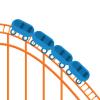
Roller Coasters
Source Institutions
In this design challenge, learners will create their own roller coaster using household objects for the track and a marble or small ball as their cart.
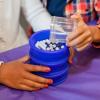
Exploring Size: Ball Sorter
Source Institutions
In this activity, learners use sieves with different-sized holes to sort balls by size.
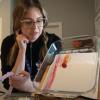
Sweet Speedway
Source Institutions
In this activity, learners test different food items by timing how long it takes each liquid to slide from the top of a ramp to the bottom.

Safe in the Sun
Source Institutions
In this activity on page 13 of the PDF, use a special plastic card that has been painted with a chemical that changes color when it is in UV light.
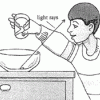
Make Money Appear Before Your Eyes
Source Institutions
In this optics activity, learners use water to make a coin "appear" and "disappear." Use this activity to demonstrate how light refracts and introduce light as waves.
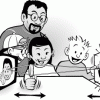
Pictures From Light
Source Institutions
Did you know that using a lens one can bend light to make pictures of the world? It's true!

Milli's Insulation Investigation
Source Institutions
In this activity on page 2 of the PDF, learners test different materials to find out which is the best insulator.

Paint a Fresco
Source Institutions
In this activity on page 7 of the PDF, learners experiment with the interesting designs that can be made by painting on plaster.

Potion Commotion
Source Institutions
In this hands-on science experiment, students combine their understanding of the different states of matter and the characteristics of various chemical reactions.

Operation Espionage
Source Institutions
In this activity, learners create and reveal secret messages written with invisible ink! The invisible ink is actually a baking soda solution, and the magical revealing liquid is fruit juice.
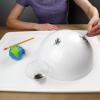
Exploring the Solar System: Magnetic Fields
Source Institutions
The "Exploring the Solar System: Magnetic Fields" activity shows participants how scientists can use tools to study the invisible magnetic fields of Earth, the Sun, and other objects in the universe.
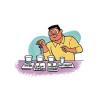
Comparing the Amount of Acid in Different Solutions
Source Institutions
In this activity, learners use detergent solution to compare two solutions containing vinegar and cream of tartar.
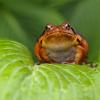
Soak It Up: Understanding Amphibian Permeability
Source Institutions
In this activity, learners will discover how the thin layers of amphibians' skin allow water and other chemicals to pass through it.

Temperature Affects Dissolving
Source Institutions
Learners design their own experiment to compare how well cocoa mix dissolves in cold and hot water. They will see that cocoa mix dissolves much better in hot water. Adult supervision recommended.
